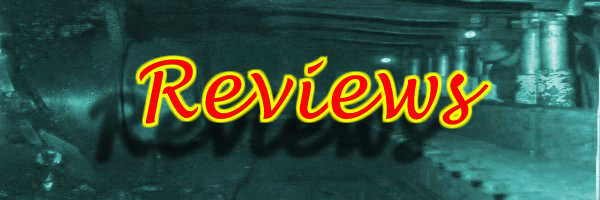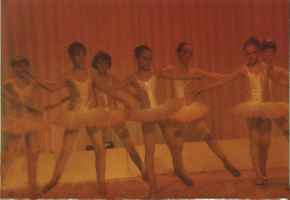
Billy Elliott
Review by David Douglass
Lets face it, the character of Billy was always going to have a hard time,
regardless of the interest in ballet. He was a pretty weird kid before
he got interested in that or discovered his best mate liked dressing up
in his sisters dresses and wearing his mam's make -up. With those qualities
in a Sunderland pit village, perhaps boxing was not a bad choice in the
first place.
Billy's gravitation toward dance and ballet in particular is essentially
a story of an individual swimming against the tide of expected and required
behaviour. Earlier explorations of this theme have found some hapless
lad expected to join his brothers and dad down the mine, as he aspires
to stay on at school/ go to university/ be a writer or work in a shop.
In this current tale the story is updated using not the hard labour of
pit work but the struggle on the picket line during the 84/5 coal strike.
It is still essentially a story of working class hard rootin tootin fighting
manhood set against the more genteel intellectualism of the more arty
and creative would be escapee. It is a well worn theme but one that can
comfortably stand such a powerful reworking as this film offers us.
Some on the left (most notably the weekly worker, and freedom) have seriously
savaged the film as being anti-working class. Violent miners are contrasted
to the nice middle class world of ballet and the arts. I didn't get that
at all. This is not we must remember a film about the strike, the strike
provides a powerful backdrop but it is just a backdrop after all. The
police rampaging through the villages and occupying pit communities as
they did is well presented here, as is the solidarity and strength of
the collective miners resistance. I watched this film in Sheffield and
there was no doubt whatever which side the audience identified with. Reviews
such as those pose the question as to what extent ballet is anyway an
entirely middle class passion. The girls in the film were obviously not
meant to be middle class, their ballet school was sited in the miners
welfare, in the heart of the village while the strike raged all round
them. Most big pit villages have dance / ballet schools the students at
which invariably are (predominantly) daughters of miners and the occasional
lad would not be unheard of. At Hatfield Colliery the Pye school of dance
is one of the most accomplished in the region, founded and instructed
by the daughter of a miner and located in her native pit village deliberately.
The students who were miners children were taught free of charge during
the strike.

Having said all that, I too got a sick feeling as the film opens portraying
Billy's dad as a violent brooding man , and feared this would be a caricature
of the miners as whole, thankfully it was not. It was obvious Billy's
dad coping with the tragic loss of his wife, left with two lads to look
after in the middle of a long strike in a bitter winter with no money
had more than most on his plate, before the youngest lad starts skipping
the light fandango. He does come through it all and thankfully without
having become a scab.
Location was obviously important to this film, which is why the makers
could have worked a little harder on getting actors from the region. With
a couple of exceptions dialect was purged from the film as it always is,
in films focused on Tyne or Wear. One has only to watch the verbally filleted
accents of Byker grove to see what I mean. Selective cultural surgery
such as this spoils the film and leaves us with that 'north of somewhere'
voice which doesn't quite come from anywhere but is meant to convey the
impression its not from down south.
This is a good film, worth seeing more than once. Although I have reservations
about the extent of reaction to the ballet classes. The strike had opened
up closed pit communities to new tolerances and other ways of living,
at least for a time. When Hatfield main branch of the mineworkers union
was adopted by the l.S.E gays and lesbian society and their collections
started to make a contribution to keeping the miners kids fed it made
some think . A year later the Hatfield Main NUM branch banner was on a
gay rights march in London. The proposal for which had brought laughter
and a few raucous wise cracks but was passed unanimously, something which
would have been inconceivable a couple of years before.
In times of collective struggle and advance new found awareness and wider
consciousness as well as individual and family relationships expand as
well. Sadly much of this has retreated with the defeat of that social
and class solidarity and a more atomised and jaundiced view has crept
back. It is clear social and political and sexual values ebb and flow
with the currents of class relationships. I would like to think a lad
during the strike aspiring to a career in ballet would have got more support
than that initially advanced to Billy, not least because the weight of
the women's support movement (totally absent from the film) was considerable
and influential, and on the other because most pit folk rejoice in those
who manage to escape the clutches of pit work and find work elsewhere.
This is a good film. See it and leave the volume on dialectical materialism
at home. This is a film which doesn't require deep philosophical investigation.